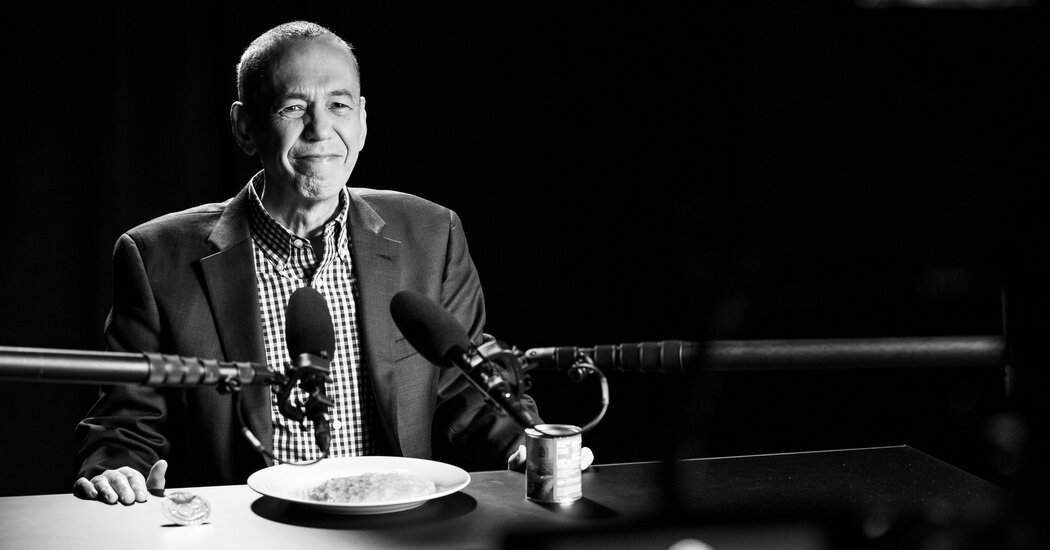
Gilbert Gottfried, the comedian who gave voice to the parrot in the hit Disney animated feature “Aladdin” and the duck in commercials for Aflac insurance — and whose manic, loudmouthed and highly original stand-up routines mixed old-fashioned borscht-belt shtick with cringeworthy vulgarity — died on Tuesday in Manhattan. He was 67.
His friend and publicist Glenn Schwartz said in a statement that the cause was muscular dystrophy.
Mr. Gottfried’s voice-over work — notably his portrayal of the excitable parrot Iago in “Aladdin” (1992) and its sequels and spinoffs — earned him a legion of fans. Many of them were too young to have seen, or even known about, the Gilbert Gottfried who was captured telling a graphically filthy joke in the 2005 documentary “The Aristocrats” — telling it in the fall of 2001 to a crowd at a roast that had grown suddenly hostile after he tried to make light of the Sept. 11 terrorist attacks.
Mr. Gottfried began doing stand-up around New York as a teenager, and soon developed a reputation among his fellow comics as a comedian’s comedian who mixed a craftsman’s attention to timing with a penchant for inventive if sometimes intentionally obscure humor.
Nevertheless, he earned enough renown to be invited to join the first “Saturday Night Live” cast assembled after the producer Lorne Michaels and all the previous cast members and writers had left, in the fall of 1980. It was a notorious disaster. He was on the show for just 13 episodes before the replacement producer, Jean Doumanian, was let go, along with almost all of the new cast. (Mr. Michaels did not return until 1985.)
But Mr. Gottfried’s newfound visibility soon brought him more work, including appearances on MTV, guest spots on sitcoms like “The Cosby Show” and small but noteworthy roles in “Beverly Hills Cop II,” “Problem Child,” “Look Who’s Talking Too” and other movies.
He didn’t leave stand-up, and as the 1980s progressed he perfected his stage persona as a dyspeptic, unlikable comedian willing to shock, awe and not look back — a stance that often got him in trouble.
Remembering Gilbert Gottfried
The gravel-voiced comedian, whose credits ranged from the family-friendly “Aladdin” to the unfettered vulgarity of “The Aristocrats,” died on April 12.
He was widely criticized after joking about masturbation at the 1991 Emmy Awards. He was fired as the voice of the Aflac duck in 2011 after making insensitive jokes on Twitter about the earthquake and tsunami in Japan that year. (Some of his even more ribald humor is collected on a 2005 DVD, “Dirty Jokes.”)
Still, Mr. Gottfried maintained an ardent following, especially among comedy connoisseurs who respected his timing as well as his other considerable talents. Although he was best known for his loud, annoying voice, he was also an excellent impressionist, whose best-known voices included Jerry Seinfeld, Andrew Dice Clay and Groucho Marx as an old man.
He was a regular on late-night talk shows and radio shows, notably Howard Stern’s, a venue where he could unwind his often rambling stories and veer a bit further into the blue comedy he specialized in. It was that same unchecked humor that made him a regular on Comedy Central’s series of roasts, in which celebrities take turns jabbing at the guest of “honor.”
Mr. Gottfried was, more than many comedians, a creature of late-night TV, reveling in aliens, lounge lizards and other weird corners of American pop culture — as he demonstrated when he hosted “Up All Night,” a weekly presentation of B- and C-grade horror and action movies that ran on the USA Network from 1989 to 1998.
He himself appeared in several movies of roughly the same quality. In “Highway to Hell,” a 1991 horror comedy, he played Hitler. In the fourth, fifth and sixth installments of “Sharknado,” about an extreme weather event that rains man-eating fish from the sky, he played a reporter.
In more recent years, Mr. Gottfried co-hosted a popular podcast, “Gilbert Gottfried’s Amazing Colossal Podcast,” with Frank Santopadre, focusing on some of the more obscure corners of showbiz and featuring interviews with movie and TV actors and other comedians. And he continued to appear in whatever pop-culture ephemera came his way, including “Celebrity Apprentice” and, with his wife, Dara, “Celebrity Wife Swap.”
In 2011 Mr. Gottfried published a well-received memoir, “Rubber Balls and Liquor,” in which he copped to his penchant for crude humor but refused to apologize.
“I don’t always mean to offend,” he wrote. “I only sometimes mean to offend.”
Gilbert Gottfried was born on Feb. 28, 1955, in Brooklyn. His family lived above a hardware store run by his father, Max, and Max’s brother Seymour. (In his book, he claimed it was called “Gilbert’s Father’s Hardware Store.”) His mother, Lillian (Zimmerman) Gottfried, was a homemaker.
His family moved around Brooklyn in areas Gilbert would later describe as awful. He escaped through watching old movies on TV and imitating celebrities.
When he was 15, he attended an open mic night at the Bitter End in Greenwich Village. He did impressions of Humphrey Bogart and other celebrities, the audience laughed, and soon he found himself hooked on performing.
“Basically, I think I was too stupid to do anything else, and that stupidity helped me,” he told The El Paso Times in 2018. “Not only was I too stupid to do anything else, but I was too stupid to think of the odds against it.”
In the late 1990s, at a Grammy Awards party at the Tavern on the Green in Manhattan, Mr. Gottfried picked up someone’s dropped food and put it on his plate. Dara Kravitz, the former owner of the food, who worked in the music industry, looked at him in disbelief. The two married in 2007 and later settled in the Chelsea neighborhood of Manhattan.
His wife survives him, along with their two children, Lily and Max, and a sister, Karen Gottfried. Another sister, Arlene Gottfried, a well-known photographer, died in 2017.
Mr. Gottfried’s stage image stood in stark contrast to his domestic life, which was featured in the 2017 documentary “Gilbert.” The film, directed by Neil Berkeley, shows him puttering around his house, playing with his children and guffawing at his wife’s jokes.
“I knew I’d never find anyone else like him,” Ms. Gottfried said in a 2013 interview with The New York Times, to which her husband replied, “Most people are hoping that they never find anyone like me.”
At least until the pandemic hit, Mr. Gottfried remained in demand as a comedian, even in an era when intentionally offensive humor runs the risk of getting a comedian canceled.
“It’s funny, because I get really neurotic about traveling and working and being very busy, and then I think my problem is that I’m in demand,” he told The Jewish Exponent in 2020. “I’m like someone who has a lemonade stand going, ‘Oh, dammit. People are buying too much lemonade from me.’”
Alex Traub contributed reporting.




